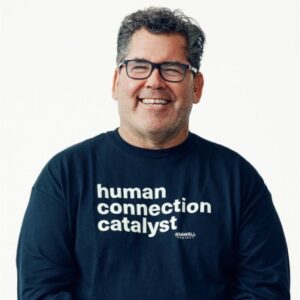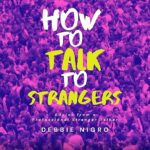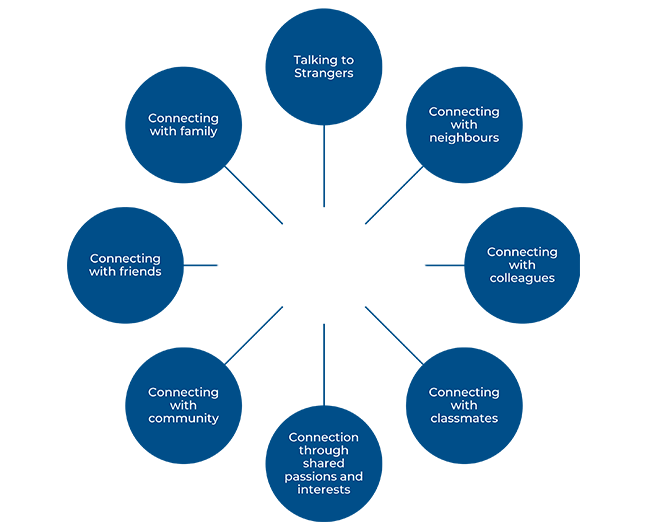Every once in a while, the universe taps you on the shoulder and says, “Here ya go … this one’s one of yours.”

That’s exactly what happened when I discovered Pete Bombaci, Founder & CEO of GenWell, Canada’s Human Connection Movement — and the man behind Talk To A Stranger Week, happening November 24–30 in Canada.

As many of you know, I’m the author of How To Talk To Strangers: Advice From a Professional Stranger Talker, so when I found out about Pete’s work, I thought, “Yup. This is my kinda guy. He won’t be a stranger for long! ” LOL

Pete and I are kindred spirits with the same mission.
To educate, empower and catalyze people in about the importance of face-to-face social connections as a proactive step that we can all take for our own health and happiness or the health and happiness of others and society.
The Big Truth: Human Connection Is Not Just Emotional — It’s Biological
We’ve all heard “connection matters,” but the science behind it is mind-blowing:
- Face-to-face interaction activates nine times more brain activity than digital communication.
- 80–90% of communication is nonverbal, so our screens simply can’t deliver what our brains and hearts crave.
- Talking to strangers has been shown to increase happiness nearly 100% of the time — for BOTH people.
- Regular social connection lowers stress, boosts the immune system, protects heart health, and can even lengthen lifespan.
Read that again. We’re wired to connect — literally.

Pete said it beautifully:
“Talking to strangers makes us happier, healthier, and more connected. The research proves it.”
And:
“We’re all just human beings trying to live a decent life. We’re far better off together than separate.”
Exactly. Exactly. Exactly.
So What Happens During Talk to A Stranger Week?
No pressure. No scripts. No “Hi, I’m Debbie from Telemarketing.” Just real human warmth in the small everyday moments:
- Say good morning to the dog walker.
- Compliment the barista.
- Shout ‘you’re doing great!’ to a struggling Mom with a wagon full of kids and expect an appreciative smile.
- Call the cousin you always say you’re going to get together with.
It’s about choosing connection over autopilot.

Pete broke it down simply:
“It costs nothing. It takes one second. And you may change someone’s day — or their life.”
The Best Part
People who talk to strangers regularly are up to three times happier than those who don’t.
Three. Times. Happier. If happiness were sold in a bottle, we’d all be lining up!

But here it is — FREE — hiding inside hello. And we’ve been overlooking it.
Listen to Our Heartfelt, Funny, and Very Real Conversation in this short podcast live from The Debbie Nigro Show.
If you’d rather read than listen the transcript of the audio is below.
(Listen Live Weekdays 11-12 noon est on WGCH Radio or listen live from anywhere on the digital livestream at WGCH.com)
We laugh, we learn, we talk Canadian coins and Chatty Cathy dolls (no, seriously), and we lean into what the world needs now — connection.
💛 Debbie
AUDIO TRANSCRIPT:
And now, back to the Debbie Nigro Show!
0:00:37
(Speaker 1)
That’s why I’m doing this segment right now. Hey, everybody. I’m Debbie Nigro. This show is live coming to you from studios in Greenwich, Connecticut today at WGCH. We’re live globally on the digital live stream at WGCH . com.
0:00:49
(Speaker 1)
And we’re going to go live to Canada today. I’m so excited to talk about what they’re doing coming November 24th to the 30th. It’s going to be Talk to a Stranger Week in Canada. Oh, my goodness. Gosh, so I am thrilled to welcome Pete Bombaci, the founder and CEO of Genwell. That’s Canada’s human connection movement.
0:01:10
(Speaker 1)
And the reason he’s here is when I found out what Pete was doing across the border, I thought, my gosh, this is a kindred spirit. I am the author of How to Talk to Strangers, Advice from a Professional Stranger Talker. So his mission hits close to my heart.
0:01:25
(Speaker 8)
Hey, Pete, welcome.
0:01:27
(Speaker 2)
Debbie, it’s great to be here. Hello, fellow stranger talker.
0:01:30
(Speaker 1)
I love your sweatshirt message that I posted your picture, Pete. Human Connection Catalyst. I love that.
0:01:38
(Speaker 2)
Yeah, thank you. We’ve been on this journey for nine years to awaken not just Canada, but the world to the importance of talking to strangers that you know all about. Unfortunately, we told people for a very long time not to do it, and the research tells us not only does it make us happier and healthier, but it has a lot of societal benefits as well.
0:01:59
(Speaker 1)
So when I heard about you, I was like, oh my gosh, I love this guy and Love him so, you know, we connected I boldly introduced myself, you know stranger to stranger and you were if you were a quick study on my energy and me on yours and I think we both are you know, have the same mission. GenWells’ mission is to educate, empower, and catalyze people in Canada and the world about the importance of face -to -face social connections. That’s the differentiator, right?
0:02:30
(Speaker 2)
Yeah, you know, again, digital technology, wonderful supplement, but you know, it’s not it can’t replace the human interactions. We know 80 to 90 % of communication is nonverbal. We lose a lot of that when we are on screens. And then and then finally, there was a study actually, at the end of the global pandemic out of Montreal that showed that face to face interactions have nine times the brain activity as a digital interaction so yes use our phones when we can’t like look at you and I having this great conversation and we’re engaged and we’re loving it but that doesn’t replace the human interactions and hopefully one day you and I’ll get connected face -to -face as well.
0:03:09
(Speaker 1)
That’d be awesome Pete. You are going to be having this week -long event right and so I’m sure you’ve given a lot of thought to what goes going to go on during this week. Explain some of the things that you’re hoping will happen during Talk to a Stranger Week in Canada.
0:03:24
(Speaker 2)
Yeah, it’s such a simple concept, but yet it requires each of us to take that action. So I know just in the studies that we’ve done up here, only 20 % of Canadians talk to strangers every day, 47 % talk to it a few times a week, and so about 50 % of us don’t make it a regular habit or routine. The research up here shows those who talk to strangers are up to three times happier than those who don’t talk to strangers. And I think it’s really cool that research Nick Epstein. out of Chicago Booth and also Dr. Gillian Sandstrom out of the UK have done research that shows it’s almost 100 % of the time when we talk to a stranger that both parties are happy that it happened. So it’s crazy to think, Debbie, that for so long we told people not to do it.
0:04:14
(Speaker 2)
And so what do we hope happens that week?
0:04:16
(Speaker 7)
Yes.
0:04:16
(Speaker 2)
You know, for you and I, the people who do it naturally, I hope we just lean into it more and recognize that we’re not just changing our lives, but we’re changing other people’s lives by those interactions to the people that are kind of questioning it and are on the fence about it. I hope it gives them enough encouragement to go look. You now understand that you’re going to make a difference in your life and somebody else’s, and it’s probably going to end up in a positive experience. So I hope you’ll try it. Maybe it’s a first time, but maybe it’s a little more often than you always do. You know, the naysayers, the people who don’t think about it at all, who won’t do it.
0:04:55
(Speaker 2)
My hope is that somebody along the other rest of the spectrum, the other 70, 80, 90 percent of people who do it might actually strike up a conversation with them and maybe get them over that hurdle of understanding that, hey, this isn’t something to be afraid of. It’s not something that we should avoid, but something that in a world where we feel more disconnected than ever before, this may be the starting point to getting them to feel like they’re seen, valued, and heard.
0:05:21
(Speaker 1)
Thank you for pointing that out because I was going to get to that. People just want to be valued. They want to be heard. They want to be acknowledged. They want to feel good about themselves. And sometimes only one other person’s comment can change it all for somebody.
0:05:35
(Speaker 2)
Yeah, well, absolutely. You know, we hear this all the time, all the research. And, you know, for those, again, as I just kind of touched on it, which is, you know, I believe that many people like you and I, Debbie, we do it naturally and frankly I don’t even sure we understood why we did it other than, yeah, it felt good. And what I want this movement to do is to make sure that all those people that are the early adopters, that are the chatty Cathy’s and the talkative Toms, I want them to recognize that the impact that they are having is something that is probably never going to be measured. It’s never going to be truly known, the level of impact that you’ve had on other people.
0:06:15
(Speaker 2)
But those people need to understand that you are changing not only somebody’s day, but maybe somebody’s life by the interactions that you have. So if we can get more people to understand this and to actually embrace it and say, Well, heck, I could do that. It costs me nothing. It takes me one second to make a smile or say hello. Then I truly do believe that people like you and I, Debbie, we will change the world. And we need it more than ever right now.
0:06:44
(Speaker 1)
Yeah, you know what we should bring back, me and you, that Chatty Cathy doll that started the whole thing off when I was a little girl. I heard you say it’s the Chatty Cathy’s of the world. It was actually a doll that came with a little record that you put inside here and you pulled a string.
0:06:55
(Speaker 2)
I remember that. Yeah, well, that’s interesting.
0:06:59
(Speaker 1)
That’s what sent me into the stratosphere, Pete. That little chatty Kathy. I was like, okay, I’m gonna she’s gonna act talk me. I don’t think so And you know, I love laughing and sharing, you know, good humor with people but to the point of just having an interaction face -to -face It could be as simple as with friends and family that you’ve been meaning to get together with her call I did this about a week and a half ago with Three second -girl cousins. I just see always briefly like wave to them in advance. I go we should get together I actually called it and we had dinner together and it was unbelievably wonderful, right? In fact, one of the girls one of my second cousins said I really need your book.
0:07:35
(Speaker 1)
I’m terrible I can’t talk to anybody. I was like, you’re kidding me. I am I’m shocked So I gave her the book and she says I’m gonna read it tonight. I was wow I said I never realized certain people just need some encouragement, right, some help, some guidelines. And we’re just saying little things, you know, casual interactions with your neighbors, your co -workers, your classmates, and little daily moments when you can say something to somebody. What’s your daily thing?
0:08:01
(Speaker 1)
And I’ll tell you mine. What do you do daily that comes naturally or that you put a little effort into in terms of connecting?
0:08:07
(Speaker 2)
I think it is actually this, and what I love about the idea of just, you know, I walk the dog every morning at 6 a . m. with my wife. She wasn’t here this week. She’s away doing some work. but I make a habit of even for those who don’t look at me naturally on their morning walk and most of them at that time of the morning are either on their normal routine of either walking their dog or going for a coffee or maybe heading to the subway to go to get transportation and I will go out of my way to make contact because I know that it’s going to at least start their day off on the right foot.
0:08:45
(Speaker 2)
And I think that’s the little thing that I can contribute to. And I’ve certainly seen, you know, the person who doesn’t respond the first time, they kind of lift their head the second time, thinking that you’re still crazy because you’re still talking to them at six o ‘clock in the morning. But there’s two or three people that today I now have conversations with, and it wouldn’t have happened if it wasn’t for those first efforts to say, good morning, how are you? You know, hope you have a great day.
0:09:12
(Speaker 1)
And those little things, can change and can lead to many other connections and conversations down the road. What did you do, Debbie? Yesterday, I came out of a deli and I had a cup of coffee and get back in my car, and I see a woman dragging a wagon of children. She has two children. She’s got a wagon, and one of the little girls had a helmet on her head. You could tell she may have had to protect her head from some illness.
0:09:34
(Speaker 1)
I’m not sure. But anyway, she was struggling, and she was trying to get them and turning around, and I opened the window. I said, oh, that’s the best. You’re doing great. Those kids are adorable.
0:09:42
(Speaker 1)
And she turned around with the biggest smile. She goes, oh, thank you. Thank you. She’s waving to me. I was like, oh, I feel so good I said that. And then, you know, I go out of my way to tell people who are in the service industry how much I appreciate them. And, you know, I lean into them and they always say, you know, that matters.
0:09:57
(Speaker 1)
Thank you. That meant a lot. So that’s the kind of stuff I do every day. But there’s, you know, there’s more.
0:10:02
(Speaker 2)
I mean, you and I could go on forever. I want to ask you, did you ever get the book I mailed to you for $6 ,000 to Canada?
0:10:09
(Speaker 1)
You know what? I don’t think I did, Debbie. Son of a gun. I got to track that sucker today. Really, Pete? You know, they charged me a zillion dollars to put a little stupid book through the door.
0:10:19
(Speaker 1)
to get to you, and I looked at the lady in the Post Office, I go, really? And she’s like, yes.
0:10:24
(Speaker 6)
I go, okay.
0:10:25
(Speaker 2)
So I’m going to check what happened to it. But anyway. That’s very funny. Our dollar is only worth about 60 cents American.
0:10:30
(Speaker 1)
So it’s usually a pretty cheap thing coming across the border.
0:10:33
(Speaker 5)
So I’m sorry to hear that.
0:10:34
(Speaker 1)
Yeah. By the way, I’m going to send you all my leftover Canadian money that I took back from my trip from Prince Edward Island two summers ago. Oh, beautiful.
0:10:43
(Speaker 2)
Oh, I loved it. I loved it. I love the Canadian culture that everybody was in Canada is fantastic and I love Canada so I have all this leftover money that you know I had to learn the monetary system it’s in you know change that’s $2 is a little $2 who could remember and then my granddaughter just came back from Canada she went on a cruise that was supposed to go to Bermuda and got directed to Canada and she goes Grammy Grammy I got Canadian money and she was excited to tell me so we’re gonna send it you all our money okay Well, that’s very kind of you, but I think I’m going to touch on something you said there. You love Canada and we love America.
0:11:15
(Speaker 1)
And so, you know, as you as you and I are finding out right here, you know, we’re all just human beings all trying to live a decent life on this planet. And, you know, we’re all far better off together than we are finding the things that differentiate us. So I hope that many people listening recognize that we are all in this together. Absolutely. Jen, well, just a little bit about your organization. I know they’re focused on shifting the conversation and engaging Canadians in a message and action that can have a positive impact on mental and physical well -being.
0:11:47
(Speaker 1)
And it’s all about social health, which cannot be done alone.
0:11:51
(Speaker 2)
How long have you been with this organization? You founded it, of course.
0:11:53
(Speaker 4)
How long has it been around in Canada?
0:11:55
(Speaker 1)
It’s been around for nine years.
0:11:57
(Speaker 2)
And, you know, the original, you may actually know what the original inspiration, do you remember the summer blackout of 2003? Sure. Sure, I do. Well, that was the original inspiration because that night I, you know, after we all made it home, because it happened at 410 in the afternoon.
0:12:13
(Speaker 1)
It was crazy.
0:12:14
(Speaker 2)
Traffic was brutal. Lights were out everywhere. Yes. I had an elderly mom that I went and checked on and she was OK. So that was that was fine. But I went to a friend’s barbecue that night and at nine o ‘clock at night I walked out.
0:12:27
(Speaker 2)
It was on a side street. I lived on a busy thoroughfare at the time. I walked out on the front porch and the street was packed with people and I just thought, oh my God, this is amazing. Look at what’s happening here. And I went out on the street and I said just that, which is, geez, I wish I lived on a street like this where everybody knew each other. And they all looked at me, Debbie, and they all said, we don’t know each other.
0:12:48
(Speaker 2)
And it was that moment that actually resonated with me for a very long time, for another decade of me talking about it. Because what really came to light for me was it was taking a crisis for us to talk to the people that we live beside, work beside, go to school beside. And that’s what the original inspiration of Gen Well was.
0:13:08
(Speaker 1)
Why don’t we create these occasions? that encourage people to get connected without needing a crisis, a snowstorm, an ice storm, a blackout, a fire, all the things that are happening.
0:13:19
(Speaker 2)
But we’re all far better off when we build these relationships before we get to the crisis. Absolutely. Have you heard of the talk to a stranger bench?
0:13:28
(Speaker 1)
Have you heard about the bench? Well, I know the Friendship Bench out of South Africa that was launched there probably about a decade ago. And that’s really about grandmothers outside of doctor’s offices or mental health organizations where grandmothers talk to people that are struggling with their mental health. But I think it’s been Adapted and launched all over which what have you seen? Oh, it’s actually called the happy to chat bench. I’m sorry I got that okay, and I read that it was you know created in England by a Woman who was walking around and saw somebody sitting by themselves on a bench and decided to talk and put a little put a little sticker There and said, you know if somebody’s sitting here alone, you know, feel you know Feel free to sit or something and there’s now they have them all over the United States the happy to chat benches I was gonna do a book tour at the happy to chat bench maybe in the future.
0:14:19
(Speaker 3)
I Love it Pete.
0:14:20
(Speaker 2)
Well, I can’t thank you anymore than telling you that it’s a real honor to have you join me from Canada.
0:14:26
(Speaker 1)
This is Pete Bombaci, the guy behind Canada’s Human Connection Movement and the founder and CEO of Genwell, who’s behind Talk to a Stranger Week in Canada, November 24th to 30th, a national reminder not only to Canada and Canadians, but to the world that a simple hello can change a day, a life, and even the world. Thank you so much, Pete. Thanks, Debbie. Take care, my friend. Okay, you too, my friend. No more strangers.



